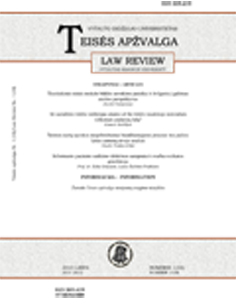Šeimos narių sąvokos neapibrėžtumas baudžiamajame procese: tos pačios lyties asmenų atvejo analizė
Definition of Family Members and Its Indetermination in Criminal Procedure: Case Study of the Same-Sex Couples
Author(s): Giedrė TomkevičiūtėSubject(s): Law, Constitution, Jurisprudence
Published by: Vytauto Didžiojo Universitetas
Keywords: Criminal procedure; Family members; Right to respect for family life; Same-sex persons; Witness' imunity; Functional approach
Summary/Abstract: Article „Definition of family members and its indetermination in criminal procedure: case study of the same-sex couples” by Giedrė Tomkevičiūtė is based on examining whether relationships of the same-sex couples fall within the legal notion of family in the context of criminal procedure in Lithuania and how to evaluate the fact of family existence while in pretrial investigation or in court. Constitutional requirement to decide case correctly inter alia implies that a court has to guarantee the rights of all parties. However, at first entities capable to acquire those rights must be specified. Although family members themselves are not considered subjects of criminal procedure, they do have certain rights, one of the most important being witness’ immunity. Therefore, it is important to define clearly who is considered... More information can be found in the article. Ar giminystės ryšiu nesusieti tos pačios lyties asmenys, gyvenantys bendrai, baudžiamojo proceso Lietuvos Respublikoje metu turi teisę būti laikomi šeimos nariais? Lietuvoje tos pačios lyties asmenų santykiai nėra siejami su galiojančiomis šeimos teisės normomis – viešoje erdvėje tai yra dažnos kritikos objektas. Vis dėlto, atsižvelgus į platų ir dviprasmišką šeimos narių apibrėžimą Lietuvos Respublikos Baudžiamojo proceso kodekso 38 straipsnyje, a priori nėra pagrindo teigti, jog tos pačios lyties asmenys nebūtų laikomi šeimos nariais baudžiamojo proceso metu, juolab kad pagal konstitucinę dokriną, santykių išraiškos forma konstitucinei šeimos sampratai esminės reikšmės neturi. Nors šeimos nariai nelaikomi baudžiamojo proceso subjektais, jie dėl savo statuso įtakos procesinėms teisėms ir pareigoms gali turėti (įskaitant teisę neduoti parodymų bei pareigą nusišalinti ir t. t.), todėl svarbu konkrečiai įvardyti šeimos nariais laikytinų subjektų... Daugiau informacijos ieškoti straipsnyje.
Journal: Teisės apžvalga
- Issue Year: 2013
- Issue No: 1(10)
- Page Range: 86-135
- Page Count: 50
- Language: Lithuanian

